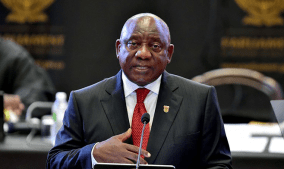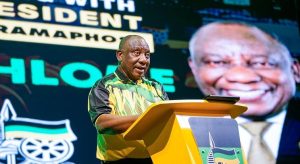Outgoing AU Chair, President Cyril Ramaphosa, says the African Continental Free Trade Area (AfCTA) will not succeed amid conflict and all member states must prioritise the “silencing of the guns”.
African countries have begun to officially trade under a new continent-wide free trade area, after months of delays caused by the global coronavirus pandemic.
Earlier, Ramaphosa addressed a virtual ceremony to mark the official launch of the agreement. He also thanked Ghana for agreeing to provide a base for the secretariat of the agreement.
“As we usher in a new era of trade and economic development on our continent we should not lose sight of our common priority of silencing the guns there can be development without peace in Africa. We should speed our efforts toward the implementation of the AU masterplan for silencing the guns. As I conclude I would like to thank the republic of Ghana for agreeing to provide a home base for the secretariat of the agreement.”
The South African President also called on AU member states to prioritise the inclusion of women and the youth within the AfCFTA.
“I appeal to all member states to spare no effort in creating conducive environments for our youth and women to benefit in the opportunities presented by the AfCFTA. Indeed the focus of our trade agreement should be directed to a larger extent on the development and sustaining small and medium enterprises and not only on well-established big companies.”
The AfCFTA will see Africa establishing a single market of more than 1.2 billion people.
This comes at a time when the United Kingdom has ceased to be a member of the European Union (AU).
Ramaphosa has commended the continent for making history.
Sophie Mokoena updates on the AfCFTA launch:
AfCTA plan
The African Continental Free Trade Area (AfCFTA) aims to bring together 1.3 billion people in a $3.4 trillion economic bloc that will be the largest free trade area since the establishment of the World Trade Organisation (WTO).
Backers say it will boost trade among African neighbours while allowing the continent to develop its own value chains. The World Bank estimates it could lift tens of millions out of poverty by 2035.
But obstacles – ranging from ubiquitous red tape and poor infrastructure to the entrenched protectionism of some of its members – must be overcome if the bloc is to reach its full potential.
Trade under the AfCFTA was meant to be launched on July 1 but was pushed back after COVID-19 made in-person negotiations impossible.
Every African country except Eritrea has signed on to the AfCFTA framework agreement, and 34 have ratified it. – additional reporting by Reuters






